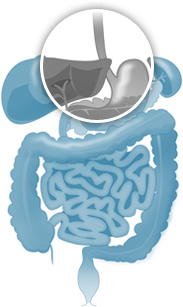Gastroesophageal reflux disease
 Definition
Definition
Gastroesophageal reflux disease (GERD) is defined as symptoms or lesions that result from the esophagus' exposure to gastric acid. Short-term reflux episodes occur in healthy subjects, but GERD becomes pathological when these episodes are abnormally frequent and long.
Epidemiological data
It is a very common condition that affects 20 at 30% of the population.
Symptoms of the disease
Gastroesophageal reflux is characterized by digestive but also extradigestive manifestations. Here are the main ones.
Typical symptoms
- pyrosis, which is a burning sensation that goes from the epigastrium to the throat, often accompanied by the return of an acidic liquid; abdominal colic preceding the emissions;
- fixed or epigastric retrosternal burns (behind the sternum).
Atypical symptoms
- ENT manifestations : laryngitis, hoarseness, pharyngeal pain ;
- bronchopulmonary manifestations: chronic cough, night dyspnea (difficulty breathing), asthma ;
- chest pain simulating coronary artery disease.
Treatments
• Medical treatment uses antacids, alginates, anti-H2 and proton pump inhibitors.
• Surgical treatment only concerns 5 % of cases and its principle is to reconstitute the anti-reflux barrier. After reducing a possible hiatal hernia, it is necessary to build, from the large gastric tuberosity, a valve that surrounds the abdominal esophagus. This intervention makes it possible to suppress reflux in 95 % of cases.
• General measures:
- raising the head of the bed by at least 15 cm ;
- reduction of overweight ;
- frequent and light meals ;
- avoid a diet high in fat, but also chocolate, mint candies, alcohol, coffee, tobacco.